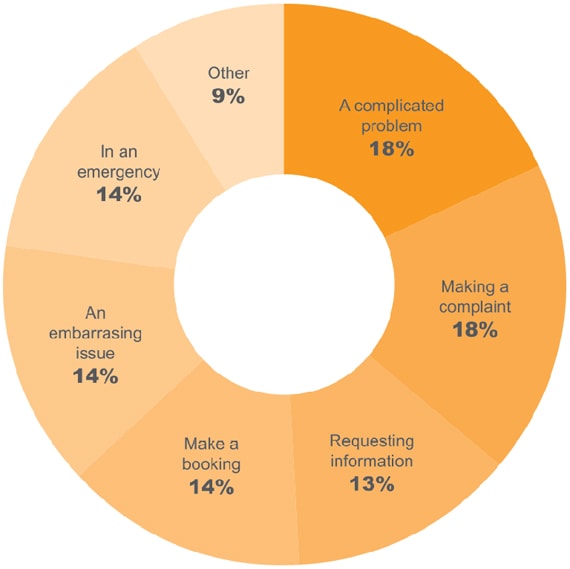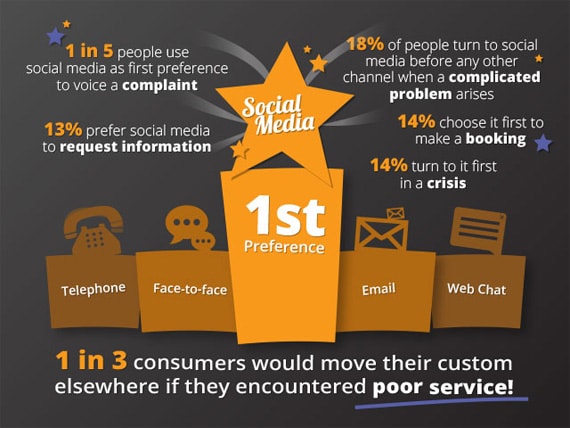 Learning from mistakes is always crucial for brands to improve their reputations, and this means paying ever closer attention to social media, especially as recent research indicates that an increasing number of consumers are turning to social media first to voice complaints, have complicated situations resolved, and when they are in crisis situations. According to a study by customer contact outsourcer Echo Managed Services, almost one in five people (18%) use social media as first preference to voice a complaint, over other contact channels including phone, face-to-face, email and web chat. The same number turn to social media before any other channel when a complicated problem arises and 14% turn to it first in a crisis, such as when a flight is cancelled.
Learning from mistakes is always crucial for brands to improve their reputations, and this means paying ever closer attention to social media, especially as recent research indicates that an increasing number of consumers are turning to social media first to voice complaints, have complicated situations resolved, and when they are in crisis situations. According to a study by customer contact outsourcer Echo Managed Services, almost one in five people (18%) use social media as first preference to voice a complaint, over other contact channels including phone, face-to-face, email and web chat. The same number turn to social media before any other channel when a complicated problem arises and 14% turn to it first in a crisis, such as when a flight is cancelled.

Key findings:
- Social media is the first preference for 13% of respondents to request information,
- A further 14% of respondents then go on to make a booking after requesting information.
- Almost one-third (29%) of consumers will move their custom elsewhere if they encounter poor service.
This highlights the importance of social media for brands, and how closely social media communication needs to be integrated with other PR functions.
Chris Cullen, head of sales and marketing at Echo Managed Services, highlights some of the challenges of managing social media strategy considering the impact of growing consumer engagement with social media: “The findings clearly demonstrate a consumer willingness to use social media in a variety of situations – perhaps most notably in complicated ones or when making a complaint. As issues raised through the channel can be unpredictable and played out in front of a potentially enormous public audience, it raises challenges in terms of who within an organisation manages social media.”
Cullen believes that it is important for the marketing department to work more closely with customer services, who are always going to be in the front line when consumers voice complaints: “It is crucial that customer services and marketing work closely together and not in isolation. Real-time customer feedback must inform and direct marketing communications, therefore it’s alarming to see so many cases of a clear disconnect between these teams.”
Customer service must be consistent across all communication channels. Cullen adds: “Due to the variety of queries coming through social media, it should be developed to be as broad as possible and not just rely on stock answers to popular questions – as is unfortunately sometimes the case with social media management. Ultimately, not prioritising social media as much as other communication channels is risky business for organisations and can potentially lead to reputational damage, and lost customers – especially considering the nature of enquiries coming through this channel.

“Whilst those turning to social media first to communicate is far from the majority of customers, it's now a sizeable enough number to mean that it can no longer be ignored by service providers.”
Methodology
Echo Managed Services surveyed a representative sample of 1,000 UK adults, asking for their experiences in communicating with everyday service providers (banks, utility companies, local government, leisure and retail businesses, etc). The full list of rankings and report can be found here.
PR Masterclass: The Intersection of PR and GEO
Join PRmoment for a Masterclass featuring 10 of the industry’s foremost experts. You will walk away with a clear, actionable strategy for adapting your content to an AI-first search environment.
Taking place on Wednesday 25th February in London, both virtual and in person tickets are available.
Early bird ticket sale ends Friday 9 January.
PR MasterclassIf you enjoyed this article, sign up for free to our twice weekly editorial alert.
We have six email alerts in total - covering ESG, internal comms, PR jobs and events. Enter your email address below to find out more:









